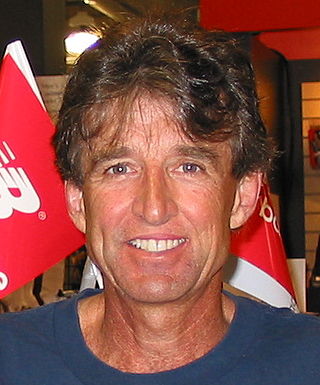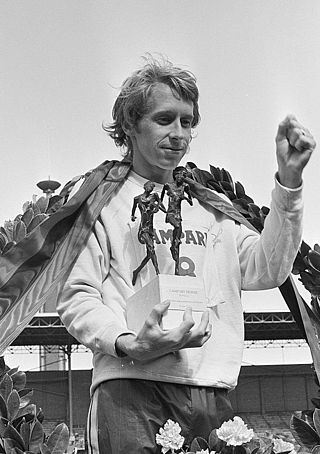Related Research Articles

Frank Charles Shorter is an American former long-distance runner who won the gold medal in the marathon at the 1972 Summer Olympics and the silver medal at the 1976 Summer Olympics. His Olympic success, along with the achievements of other American runners, is credited with igniting the running boom in the United States during the 1970s.

William Mervin Mills, also known by his Oglala Lakota name Tamakhóčhe Theȟíla, is an American Oglala Lakota former track and field athlete who won a gold medal in the 10,000 metre run (6.2 mi) at the 1964 Tokyo Olympics. His 1964 victory is considered one of the greatest Olympic upsets because he was a virtual unknown going into the event. He was the first non-European to win the Olympic event and remains the only winner from the Americas. He was also a United States Marine officer.

William Henry Rodgers is an American runner, Olympian, and former record holder in the marathon. Rodgers is best known for his four victories in both the Boston Marathon, including three straight from 1978 to 1980, and 4 straight wins in the New York City Marathon, between 1976 and 1979.

Grandma's Marathon (Grandma's) is an annual road race held each June in Duluth, Minnesota, in the United States. The course runs point-to-point from the city of Two Harbors on Scenic Route 61 and continues along Lake Superior into the city of Duluth. The finish is located in Canal Park, near Grandma's Restaurant, which is next to the highly visible Aerial Lift Bridge.
Craig Steven Virgin is an American distance runner. He was born in Belleville, Illinois, and grew up near Lebanon, Illinois. While in high school, Virgin won 5 state championships as well as setting the national outdoor high school 2-mile record of 8:40.9. Additionally, Virgin held the Illinois Boys Cross Country all-time state championship record for 47 years, running a 13:50.6 in 1972, a record that stood until November 9, 2019, when Josh Methner of John Hersey High School ran a 13:49.86. Virgin was Track and Field News "High School Athlete of the Year" in 1973.

Galen Rupp is an American long-distance runner. He competed in the Summer Olympics in 2008 in Beijing, 2012 in London, 2016 in Rio de Janeiro and 2021 in Tokyo. He won the silver medal in the men's 10,000 meters in London and the bronze medal in the men's marathon in Rio de Janeiro. Rupp competed for the University of Oregon and trained under Alberto Salazar as a member of the Nike Oregon Project. He won the 2017 Chicago Marathon, becoming the first American to do so since Khalid Khannouchi in 2002. Rupp won the marathon at the 2020 U.S. Olympic Trials in Atlanta with a time of 2:09:20, and qualified for the 2020 Tokyo Olympic Games, where he finished eighth.

Kara Goucher is an American long-distance runner, author, television commentator, and podcaster. She was the 10,000 meters silver medalist at the 2007 World Championships in Athletics and represented the USA at the 2008 Beijing Olympics and 2012 London Olympics. She made her marathon debut in 2008 and finished third the following year at the Boston Marathon.

Carrie Anne Tollefson is an American former middle-distance runner who was on the US 2004 Summer Olympic team.
Proctor High School is a 9–12 secondary school in Proctor, Minnesota, United States that was established in 1912.
Jack Strangl Bacheler is an American former long-distance runner and two-time U.S. Olympian. Born in Washington, District of Columbia, Bacheler was a founding member of the Florida Track Club at Gainesville, Florida in the late 1960s, and personally designed the club's distinctive "orange" logo. Standing 6 feet 7 inches, yet weighing only 165 pounds, he towered over most of his competitors. Now living in Clayton, North Carolina, he is married to Patricia Bacheler. Bacheler has two children, daughter Teresa (Teri), and son Matthew (Matt).
Lisa Uhl is an American runner. She is a four-time NCAA Division One champion, former NCAA record holder in the 10,000 meters, and the sixth fastest American woman to ever cover that distance. She competed in the 10,000 meters in the 2012 Summer Olympics. She competed for Iowa State University.

Molly Huddle is an American long-distance runner who competes in track and cross country running events. She held the American record in the 5000 meters set in 2014 in Monaco (14:42.64), which has since been lowered by Shannon Rowbury, Shelby Houlihan and Alicia Monson. Huddle held also the American record in the 10,000 meters set at the 2016 Rio Olympics with a time of 30:13.17, which has since been lowered by Alicia Monson.
Gary Tuttle is an American long distance runner and local politician from Ventura, California. Over a lengthy career, he won two NCAA Men's Outdoor Track and Field Championships, set three American records, ran for the USA team at the IAAF World Cross Country Championships, won the Bay to Breakers race in 1974 and placed second in the Boston Marathon in 1985.

Leonard Essau Korir is an American long-distance runner who competes over distances from 5000 meters to the marathon. He is a two-time NCAA champion, winning an indoor 5000 m title and outdoor 10,000 meters title in 2011 for the Iona Gaels. He gained United States citizenship and began competing for his adoptive nation in 2016.

Shadrack Kiptoo Biwott is a Kenyan-born American long-distance runner.
Bob Wallace was a runner from Croydon, Victoria, Australia. He was best known for running the marathon, with a PR of 2:13:14 in 1981.

Joe Klecker is an American long-distance runner. After a successful collegiate career with the Colorado Buffaloes he turned professional in 2020 joining the On Athletics Club coached by Dathan Ritzenhein. Klecker holds personal bests of 3:37.00 for 1500m, 7:34.14 for 3000m, 12:54.99 for 5000m, and 27:07.57 for 10000m, all set as a part of the On Athletics Club.
Pasca Jerono is a Kenyan-born American middle- and long-distance runner best known for winning the 2014 Grandma's Marathon in 2:33:45.

Dakotah Marie Lindwurm is an American professional long-distance runner sponsored by Puma who qualified to represent the United States at the 2024 Summer Olympics in Paris, France. Lindwurm gained notoriety after winning back-to-back victories at Grandma's Marathon in Duluth, Minnesota in 2021 and 2022. Her victory in 2022 made her the 12th fastest U.S. women's marathoner of all time.

Minnesota Distance Elite, previously known as Team USA Minnesota, is a long-distance running team based in the U.S. state of Minnesota. The team is designed to support the running careers of post-collegiate athletes, supporting athletes from middle distance to the marathon. By 2024, Minnesota Distance Elite is widely recognized as one of the top American running teams.
References
- 1 2 3 4 5 "Garry Bjorklund – Athlete Profile". International Association of Athletics Federations. Retrieved November 15, 2018.
- 1 2 3 "Garry Bjorklund". Sports Reference LLC. Archived from the original on November 5, 2012. Retrieved July 14, 2011.
- 1 2 3 4 5 Benyo and Henderson, pp. 37–38.
- 1 2 Mahler, Charlie. "Déjà Vu: Garry Bjorklund Looks Back on a 39-Year-Old Record". USA Track & Field Minnesota. Archived from the original on March 15, 2016. Retrieved December 24, 2019.
- ↑ "All-Time State Boys Track and Field Meet Records" (PDF). Minnesota State High School League. Retrieved November 4, 2021.
- 1 2 3 4 5 6 "Garry Bjorklund". University of Minnesota. Retrieved May 20, 2017.
- ↑ "3 Meet Records Broken in NCAA". The Milwaukee Journal. Associated Press. June 19, 1971. p. 16. Retrieved July 14, 2011.
- ↑ Christensen, p. 183.
- ↑ Newnham, Blaine (June 23, 1976). "The crowd picks a favorite". The Register-Guard. p. 1B. Retrieved July 15, 2011.
- ↑ Letwin, Bill (May 14, 1974). "Indiana Strong Threat to Keep Track Title". The Milwaukee Journal. sec. 2, p. 11. Retrieved July 15, 2011.
- ↑ "Slow start for Yanks". The Spokesman-Review. Associated Press. October 14, 1975. p. 18. Retrieved July 15, 2011.
- 1 2 3 Conrad, John (June 23, 1976). "Bjorklund barefoots it in behind Shorter". The Register-Guard. p. 3B. Retrieved July 15, 2011.
- ↑ "They're Off and Running...Jumping". Pittsburgh Post-Gazette. July 24, 1976. p. 7. Retrieved July 15, 2011.
- ↑ "Track Superiority Over for Americans". The Milwaukee Journal. July 27, 1976. sec. 2, p. 8. Retrieved July 15, 2011.
- ↑ "Track takes a shot". The Register-Guard. April 28, 1978. p. 2D. Retrieved July 15, 2011.
- ↑ "Winner Surprised". The Robesonian. Associated Press. December 5, 1977. p. 10. Retrieved July 15, 2011.
- ↑ Rosenthal, Bert (October 23, 1978). "Rodgers, Waitz Claim Marathon". The Portsmouth Times. Associated Press. p. 16. Retrieved July 15, 2011.
- ↑ Sandrock, p. 114.
- ↑ "Rodgers King Of The Road". Sarasota Journal. United Press International. April 17, 1979. p. 3-B. Retrieved July 15, 2011.
- ↑ Leavy, Jane (April 21, 1980). "'The Game's Changing', but Not at Today's Boston Marathon". The Washington Post. Retrieved November 15, 2018.
- ↑ "Prominent runner entered at Everly". The Daily Reporter. August 7, 1981. p. 8. Retrieved July 16, 2011.
- ↑ Moody, Dick (April 9, 1981). "Shoes 'protect' runners". Spokane Daily Chronicle. p. 21. Retrieved July 16, 2011.
- ↑ Goldstein, Steve (May 28, 1984). "Pfitzinger passes Salazar for No. 1 Olympic spot". The Evening Independent. p. 5-C. Retrieved July 16, 2011.
- ↑ Withers, Bud (June 20, 1984). "Slow 10,000 plays into hands of kickers Cummings, Virgin". The Register-Guard. p. 5C. Retrieved July 16, 2011.
- ↑ Pates, Kevin (June 20, 2015). "Half-marathon goes to the wire for top 3 finishers". Star Tribune. Retrieved February 11, 2020.
- ↑ "RRCA Hall of Fame Inductees 1980–1989". Road Runners Club of America. Retrieved July 16, 2011.
- ↑ "Bjorklund into Colorado Running Hall of Fame". Duluth News Tribune. April 24, 2012. Retrieved July 10, 2014.
- ↑ Weegman, Rick (June 16, 2015). "Half-marathon almost had an identity crisis with its namesake, Garry Bjorklund". Duluth News Tribune. Retrieved March 26, 2017.
